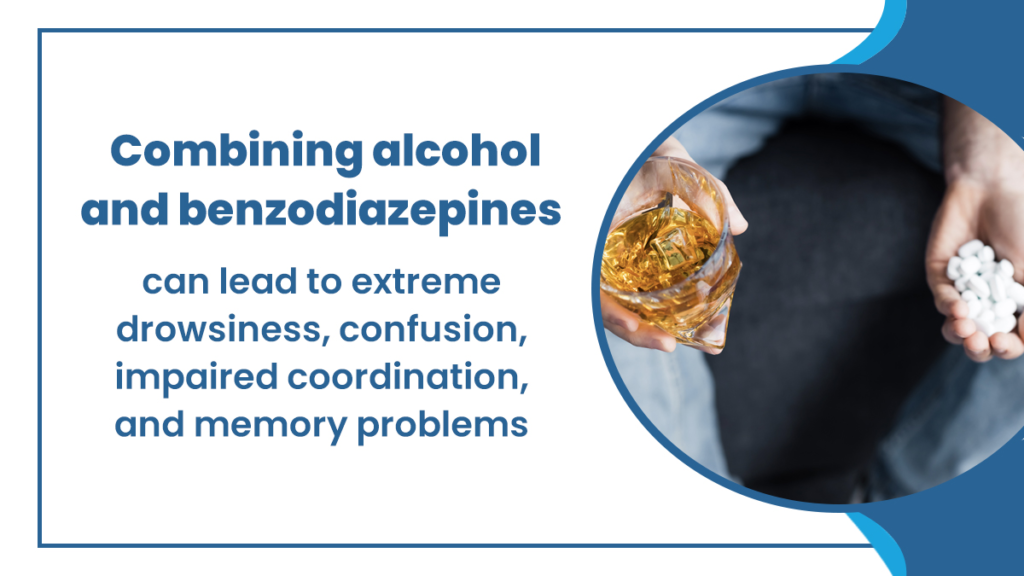Mixing alcohol and benzodiazepines can have severe consequences for your health. Benzodiazepines, commonly used to treat anxiety and insomnia, act as central nervous system depressants.

When combined with alcohol, which also depresses the central nervous system, the effects can be, increased sedation, impaired coordination, memory problems, and respiratory depression.
This dangerous combination can even result in overdose or death. Keep reading to understand the dangers of mixing alcohol and benzodiazepines.
Key Takeaways
Combining alcohol and benzodiazepines is not safe for physical and mental health.
- Mixing alcohol and benzodiazepines can have severe and potentially life-threatening consequences.
- Combining alcohol and benzodiazepines can lead to extreme drowsiness, confusion, impaired coordination, and memory problems.
- Seek medical advice if you are prescribed benzodiazepines and have concerns about alcohol consumption.
Reach out to The Haven Detox-Little Rock (501) 271-3342 for more information about substance abuse recovery.
Benzodiazepines: A Brief History
Benzodiazepines, a class of psychoactive drugs, have a rich and influential history in medicine. Developed in the 1950s, benzodiazepines quickly gained popularity due to their efficacy in treating anxiety, insomnia, seizures, and muscle spasms.
The discovery of chlordiazepoxide, the first benzodiazepine, revolutionized the treatment of anxiety disorders. It was followed by the introduction of diazepam, commonly known as Valium, which became one of the most widely prescribed drugs of its time.
Throughout the decades, benzodiazepines have faced both praise and criticism. They offered significant relief to countless individuals, but their potential for misuse and dependence also became evident. Concerns regarding their long-term effects led to tighter regulations and increased awareness of responsible prescribing practices.
Despite these challenges, benzodiazepines remain essential to modern psychiatric and neurological treatments. The development of newer benzodiazepines with improved safety profiles and targeted effects has continued.
Today, these doctors consider individual needs and potential risks before prescribing benzodiazepines. Alternative therapies and non-pharmacological interventions are also explored to ensure comprehensive patient care.
Dangers of Combining Benzodiazepines and Alcohol
Combining benzodiazepines and alcohol can be extremely dangerous and should be avoided. Both substances are central nervous system depressants, which slow brain and body activity. However, when combined, their effects are multiplied and can lead to severe consequences.
Here are some of the dangers associated with mixing benzodiazepines and alcohol:
Dangerous Interactions
Combining benzodiazepines and binge drinking can lead to addictive interactions that amplify both substances’ effects. Benzodiazepines, a class of drugs commonly used to treat anxiety and insomnia, act as central nervous system depressants, slowing down brain activity.
Alcohol has similar toxic effects, intensifying the sedative properties of benzodiazepines. This combination can cause severe drowsiness, impaired coordination, confusion, brain damage, and memory problems. It can also lead to blackouts and increase the risk of accidents and injuries.
Overdose
The simultaneous use of benzodiazepines and alcohol significantly increases the risk of overdose. Both substances depress the central nervous system, affecting the heart rate, breathing, and blood pressure. When taken together, they can suppress these vital functions to dangerous levels, potentially leading to respiratory distress, coma, or even death.
Moreover, patients who misuse or abuse benzodiazepines and alcohol are more likely to engage in risky behaviors and consume higher doses, raising the risk of overdose.
Regularly combining benzos and alcohol can have severe long-term health consequences. Prolonged use can lead to liver damage. Chronic use of benzodiazepines can also result in physical and psychological dependence, leading to addiction.
Furthermore, long-term abuse of both substances can increase the risk of mental health disorders, memory impairment, and cognitive decline.
Overdose Prevention
Overdose prevention refers to strategies and interventions to reduce the risk of a drug overdose, which occurs when a person consumes an excessive amount of a substance or a combination of substances, leading to harmful physiological effects and potential death. Overdoses can result from using illicit drugs, prescription medications, or over-the-counter substances.
Signs of Benzodiazepines Overdose
Benzodiazepines treat anxiety, insomnia, and seizures. However, misuse or accidental overdose of benzodiazepines can have severe consequences. Recognizing the signs of a benzodiazepine overdose is crucial for timely intervention.
Withdrawal symptoms may include extreme drowsiness, confusion, slurred speech, slowed breathing, and decreased coordination. In severe cases, an individual may experience unconsciousness or even a coma.
If someone exhibits these signs, seeking immediate medical supervision and calling emergency services is essential.
Signs of Alcohol Poisoning
Alcohol poisoning is a life-threatening condition caused by consuming excessive amounts of alcohol within a short period. It is important to be aware of the signs of alcohol abuse to prevent fatal consequences. Alcohol withdrawal symptoms may include confusion, vomiting, seizures, slow or irregular breathing, blue-tinged or pale skin, unconsciousness, and hypothermia.
If someone displays these symptoms, call emergency services immediately. While waiting for help, keeping the affected individual on their side to prevent choking on vomit and providing reassurance can be beneficial.
Understand Prescription Instructions
Follow your prescription instructions carefully to prevent medication-related complications and overdose. When prescribed a medication, ask your doctor or pharmacist any questions regarding the dosage, frequency, and serious side effects.
If the prescribed medication does not seem to provide the desired effect or you experience any adverse reactions, seek immediate medical attention rather than self-adjusting the dosage.
What to Do If You Mix Alcohol and Benzodiazepines
If you find yourself in a situation where you have mixed alcohol and benzodiazepines, take immediate action to ensure your safety:
- Seek medical help: Call emergency services or visit the nearest treatment facility. Do not underestimate the potential risks and complications of this combination.
- Avoid driving or operating machinery: The combination of alcohol and benzodiazepines can impair your coordination, judgment, and reaction time, making it extremely dangerous to drive or engage in activities that require focus and alertness.
- Stay hydrated: Drink plenty of water to counteract the dehydrating effects of alcohol and help flush out toxins from your system. Avoid caffeine or energy drinks, as they can further strain your body.
- Do not induce vomiting: Vomiting may increase the risk of choking, especially if your coordination and reflexes are impaired. It is best to let medical professionals handle any necessary interventions.
- Be honest with healthcare providers: Provide accurate information about your consumed substances. This will help doctors provide appropriate treatment options and support.
Frequently Asked Questions (FAQ)
What happens if you mix anxiety pills with alcohol?
Mixing anxiety pills with alcohol can have dangerous consequences. Both substances can depress the central nervous system, leading to extreme drowsiness, impaired coordination, and slowed breathing. It increases the risk of overdose, respiratory distress, and even death.
Combining these substances is discouraged and should be avoided to ensure personal safety. Seek professional medical advice for concerns or questions regarding medication and alcohol interactions.
How dangerous is mixing alcohol with Ativan?
Mixing alcohol with Ativan, a benzodiazepine medication, can be extremely dangerous. Both substances depress the central nervous system, leading to increased sedation, respiratory depression, and potential overdose.
The combination can result in severe drowsiness, impaired coordination, memory loss, and even coma or death. It is crucial to avoid mixing alcohol with Ativan or any other benzodiazepine.
What should you never take with benzodiazepines?
It is crucial to avoid combining prescription drugs like benzodiazepines with alcohol, opioids, or other sedative medications, as this can lead to severe respiratory depression, sedation, and serious health problems.
These substances can amplify the sedative effects of benzodiazepines and increase the risk of overdose. Always consult with a healthcare professional regarding medication interactions and usage guidelines.
Overcome Substance Abuse with The Haven-Detox Little Rock
Experience a transformative journey toward recovery with The Haven Detox-Little Rock. Our specialized treatment programs guide you toward a healthier and addiction-free life.
Our detox program ensures a safe and comfortable withdrawal process, and our residential program offers a supportive environment for healing and recovery.
Furthermore, we utilize evidence-based therapies and proven methods to develop reliable coping strategies to support your journey toward lasting recovery.Take the first step towards a brighter tomorrow. Choose The Haven-Detox Little Rock (501) 271-3342 and break free from substance abuse today.



